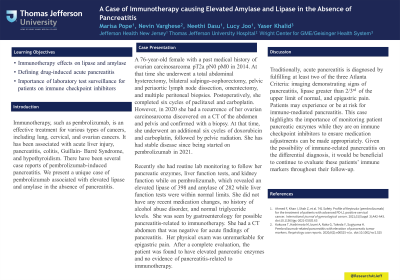Tuesday Poster Session
Category: Biliary/Pancreas
P2945 - A Case of Immunotherapy Causing Elevated Amylase and Lipase in the Absence of Pancreatitis
Tuesday, October 24, 2023
10:30 AM - 4:00 PM PT
Location: Exhibit Hall

Has Audio

Marisa Pope, DO
Jefferson Health
Stratford, NJ
Presenting Author(s)
Marisa Pope, DO1, Nevin Varghese, MD2, Neethi Dasu, DO3, Lucy Joo, DO4, Yaser Khalid, DO5
1Jefferson Health, Stratford, NJ; 2Thomas Jefferson University Hospital, Philadelphia, PA; 3Jefferson Health, New Jersey, NJ; 4Jefferson Health, Cherry Hill, NJ; 5Wright Center for GME/Geisinger Health System, Scranton, PA
Introduction: Immunotherapy, such as pembrolizumab, is an effective treatment for various types of cancers, including lung, cervical, and ovarian cancers. It has been associated with acute liver injury, pancreatitis, colitis, and Guillain- Barré Syndrome, and hypothyroidism. There have been several case reports of pembrolizumab-induced pancreatitis. We present a unique case of pembrolizumab associated with elevated lipase and amylase in the absence of pancreatitis.
Case Description/Methods: A 76-year-old female with a past medical history of ovarian carcinosarcoma pT2a pN0 pM0in 2014 status post immunotherapy with pembrolizumab. She underwent a total abdominal hysterectomy, bilateral salpingo-oophorectomy, pelvic and periaortic lymph node dissection, omentectomy, and multiple peritoneal biopsies. Postoperatively, she completed six cycles of paclitaxel and carboplatin. However, in 2020 she had a recurrence of her ovarian carcinosarcoma noted on CT abdomen and pelvis. At that time, she underwent another round of six cycles of doxorubicin and carboplatin, followed by pelvic radiation. She has had stable disease since being started on pembrolizumab in 2021.
Recently she had routine lab monitoring of her pancreatic enzymes, liver function tests, and kidney function while on pembrolizumab, which revealed an elevated lipase of 398 and amylase of 282 while liver function tests were within normal limits. She did not have any recent medication changes, no history of alcohol abuse disorder, and normal triglyceride levels. She was seen by gastroenterology for possible pancreatitis-related to immunotherapy. She had a CT abdomen that was negative for acute findings of pancreatitis. After a complete evaluation, the patient was found to have elevated pancreatic enzymes and no evidence of pancreatitis-related immunotherapy.
Discussion: Traditionally, acute pancreatitis is diagnosed by fulfilling at least two of the three Atlanta Criteria: imaging demonstrating signs of pancreatitis, lipase greater than 2/3rd of the upper limit of normal, and epigastric pain. Patients may experience or be at risk for immune-mediated pancreatitis. This case highlights the importance of monitoring the patient’s pancreatic enzymes while the patients are on immune checkpoint inhibitors to ensure medication adjustments can be made appropriately. Given the possibility of immune-related pancreatitis on the differential diagnosis, it would be beneficial to continue to evaluate these patients’ immune markers throughout their follow-up.
Disclosures:
Marisa Pope, DO1, Nevin Varghese, MD2, Neethi Dasu, DO3, Lucy Joo, DO4, Yaser Khalid, DO5. P2945 - A Case of Immunotherapy Causing Elevated Amylase and Lipase in the Absence of Pancreatitis, ACG 2023 Annual Scientific Meeting Abstracts. Vancouver, BC, Canada: American College of Gastroenterology.
1Jefferson Health, Stratford, NJ; 2Thomas Jefferson University Hospital, Philadelphia, PA; 3Jefferson Health, New Jersey, NJ; 4Jefferson Health, Cherry Hill, NJ; 5Wright Center for GME/Geisinger Health System, Scranton, PA
Introduction: Immunotherapy, such as pembrolizumab, is an effective treatment for various types of cancers, including lung, cervical, and ovarian cancers. It has been associated with acute liver injury, pancreatitis, colitis, and Guillain- Barré Syndrome, and hypothyroidism. There have been several case reports of pembrolizumab-induced pancreatitis. We present a unique case of pembrolizumab associated with elevated lipase and amylase in the absence of pancreatitis.
Case Description/Methods: A 76-year-old female with a past medical history of ovarian carcinosarcoma pT2a pN0 pM0in 2014 status post immunotherapy with pembrolizumab. She underwent a total abdominal hysterectomy, bilateral salpingo-oophorectomy, pelvic and periaortic lymph node dissection, omentectomy, and multiple peritoneal biopsies. Postoperatively, she completed six cycles of paclitaxel and carboplatin. However, in 2020 she had a recurrence of her ovarian carcinosarcoma noted on CT abdomen and pelvis. At that time, she underwent another round of six cycles of doxorubicin and carboplatin, followed by pelvic radiation. She has had stable disease since being started on pembrolizumab in 2021.
Recently she had routine lab monitoring of her pancreatic enzymes, liver function tests, and kidney function while on pembrolizumab, which revealed an elevated lipase of 398 and amylase of 282 while liver function tests were within normal limits. She did not have any recent medication changes, no history of alcohol abuse disorder, and normal triglyceride levels. She was seen by gastroenterology for possible pancreatitis-related to immunotherapy. She had a CT abdomen that was negative for acute findings of pancreatitis. After a complete evaluation, the patient was found to have elevated pancreatic enzymes and no evidence of pancreatitis-related immunotherapy.
Discussion: Traditionally, acute pancreatitis is diagnosed by fulfilling at least two of the three Atlanta Criteria: imaging demonstrating signs of pancreatitis, lipase greater than 2/3rd of the upper limit of normal, and epigastric pain. Patients may experience or be at risk for immune-mediated pancreatitis. This case highlights the importance of monitoring the patient’s pancreatic enzymes while the patients are on immune checkpoint inhibitors to ensure medication adjustments can be made appropriately. Given the possibility of immune-related pancreatitis on the differential diagnosis, it would be beneficial to continue to evaluate these patients’ immune markers throughout their follow-up.
Disclosures:
Marisa Pope indicated no relevant financial relationships.
Nevin Varghese indicated no relevant financial relationships.
Neethi Dasu indicated no relevant financial relationships.
Lucy Joo indicated no relevant financial relationships.
Yaser Khalid indicated no relevant financial relationships.
Marisa Pope, DO1, Nevin Varghese, MD2, Neethi Dasu, DO3, Lucy Joo, DO4, Yaser Khalid, DO5. P2945 - A Case of Immunotherapy Causing Elevated Amylase and Lipase in the Absence of Pancreatitis, ACG 2023 Annual Scientific Meeting Abstracts. Vancouver, BC, Canada: American College of Gastroenterology.
